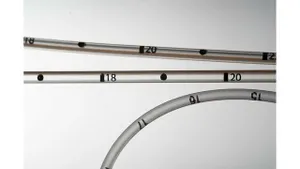FDA tackles opportunities, challenges of 3D-printed medical devices
The incredible potential of 3D printing to transform the medical manufacturing space has not escaped FDA's attention.
June 2, 2014
The incredible potential of 3D printing to transform the medical manufacturing space has not escaped FDA's attention. The agency has already begun receiving 510(k) premarket notification and premarket approval (PMA) submissions for devices in which the technology is used, and there have been some famous instances, such as a 3D-printed trachea that saved an infant's life, where the investigational device exemption pathway offered a route to compliance. As 3D-printed organs and orthopedic devices manufactured at the bedside to fit individual anatomies enter the realm of reality, FDA has announced a public workshop in October 2014 to investigate the fundamental regulatory issues that the technology brings to the surface. Before that, Steven K. Pollack, PhD, Director of the Office of Science & Engineering Labs, FDA, will provide attendees of MD&M East and PLASTEC East with an update of the FDA perspective on 3D printing medical devices. His session is scheduled at 11:30 AM on June 11 at the Javits Convention Center in New York, NY. He recently shared some observations in advance of the event with PlasticsToday.
"The safety and effectiveness of any individual product will continue to be determined through the traditional FDA submission and review process," Pollack told PlasticsToday. "The benefit of 3D printing (or additive manufacturing) is that it greatly expands the ability to create devices that are matched to individual patient anatomy. 3D-printing techniques have different technical considerations than standard manufacturing," he adds, and to establish product safety, "devices manufactured using this technology may need additional or different testing than is normally required of products manufactured using traditional (or subtractive) techniques. Furthermore, traditional manufacturing settings have design controls and systems for complaint handling, and so forth.mAs 3-D printing technology develops, manufacturing may shift to the bedside and FDA may need to provide clarity on these requirements as well as other quality control issues such as material qualifications and sterility."
Although the manufacturing method is of interest, ultimately the agency evaluates all devices for safety and effectiveness and appropriate benefit and risk determination, explains Pollack, regardless of the manufacturing technologies used. "In some cases, we may require manufacturers to provide us with additional data, based on the complexity of the device."
The Center for Devices and Radiological Health at FDA has already cleared a number of 3D-printed devices through the 510(k) process, notes Pollack, and an inter-center working group is assessing technical and regulatory considerations for additive manufacturing moving forward. "As FDA learns more about the 3D process, the agency may consider drafting guidance to address specific additive manufacturing questions," he says.
There are always new technologies around the corner, he notes, adding that research laboratories are using 3D printing for much more than medical devices, and companies are always finding creative ways of adapting consumer technologies to the medical device market. "The FDA will continue to monitor technology trends and provide a path from research to market using the best science to ensure those technologies are safe and effective for patients," he says.
These and other topics will be touched on by Pollack at the MD&M East conference. On the agenda: FDA's existing experience with 3D-printed devices that have been cleared; the overarching new questions this technology brings; how FDA is working as one agency to address 3D printing; and a glimpse of the agency's internal research into the opportunities and challenges 3D printing presents for developing innovative, safe, and effective medical devices.
Consider this session as an excellent backgrounder for the forthcoming FDA workshop, "Additive Manufacturing of Medical Devices: An Interactive Discussion on the Technical Considerations of 3-D Printing," which will be held on October 8 and 9, 2014, in Silver Spring, MD. The workshop is described as a forum where FDA officials, medical device manufactures, additive manufacturing companies, and academia can discuss the technical challenges and solutions of 3-D printing. It has been noted that ideas generated during the workshop may facilitate development of draft guidance and/or standards for additive manufacturing of medical devices.
Norbert Sparrow is Senior Editor at PlasticsToday. Follow him on twitter @norbertcsparrow and Google+.
About the Author(s)
You May Also Like




